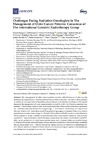Please use this identifier to cite or link to this item:
http://hdl.handle.net/10553/69893
| Title: | Challenges facing radiation oncologists in the management of older cancer patients: Consensus of the international geriatric radiotherapy group | Authors: | Popescu, Tiberiu Karlsson, Ulf Vinh-Hung, Vincent Trigo, Lurdes Thariat, Juliette Vuong, Te Baumert, Brigitta G. Motta, Micaela Zamagni, Alice Bonet, Marta Myint, Arthur Sun Lara Jiménez, Pedro Carlos Nguyen, Nam P. Arenas, Meritxell |
UNESCO Clasification: | 320101 Oncología | Keywords: | Comorbidity Discrimination Frailty Older Radiotherapy Tolerance |
Issue Date: | 2019 | Journal: | Cancers (Basel) | Abstract: | The management of older cancer patients remains difficult because of data paucity. Radiation oncologists need to identify potential issues which could affect treatment of those patients. A workshop was organized in Barcelona among international radiation oncologists with special interest in the management of older cancer patients on April 22, 2018. The following consensus was reached: 1. Older cancer patients often faced unconscious discriminating bias from cancer specialists and institutions because of their chronological age. 2. Advances in radiotherapy techniques have allowed patients with multiple co-morbidities precluding surgery or systemic therapy to achieve potential cure in early disease stages. 3. The lack of biomarkers for frailty remains an impediment to future research. 4. Access to healthcare insurance and daily transportation remains an issue in many countries; 5. Hypofractionation, brachytherapy, or stereotactic techniques may be ideally suited for older cancer patients to minimize transportation issues and to improve tolerance to radiotherapy. 6. Patients with locally advanced disease who are mentally and physically fit should receive combined therapy for potential cure. 7. The role of systemic therapy alone or combined with radiotherapy for frail patients needs to be defined in future clinical trials because of targeted agents or immunotherapy may be less toxic compared to conventional chemotherapy. | URI: | http://hdl.handle.net/10553/69893 | ISSN: | 2072-6694 | DOI: | 10.3390/cancers11030371 | Source: | Cancers [ISSN 2072-6694], v. 11 (3), 371 |
| Appears in Collections: | Artículos |
SCOPUSTM
Citations
35
checked on Mar 30, 2025
WEB OF SCIENCETM
Citations
33
checked on Mar 30, 2025
Page view(s)
116
checked on Mar 1, 2025
Download(s)
144
checked on Mar 1, 2025
Google ScholarTM
Check
Altmetric
Share
Export metadata
Items in accedaCRIS are protected by copyright, with all rights reserved, unless otherwise indicated.
